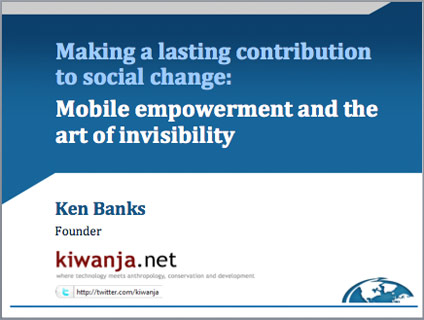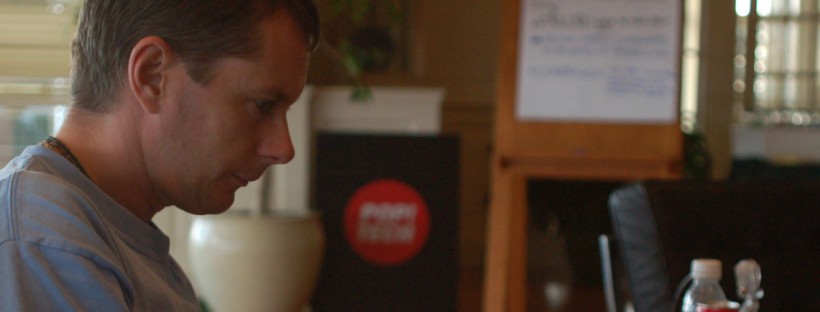Northern Zambia, August 1993. We set off from Chilubula – where we were helping build a school – for another village a couple of hours away. They didn’t have a school. They didn’t seem to have much, in fact. As our pick-up approached, children ran out to greet us, throwing themselves onto their knees. Many of them saw us as saviours, visitors from afar who had the power to build them schools, drill them wells and change their lives in unimaginable ways.
While some people enjoyed the attention, for me it was an uncomfortable experience. It may be hard to not be the “white man in Africa” when you’re white and in Africa, but that doesn’t mean you have to behave like one. Humility is lacking in so many walks of life, yet a lack of it seemed even more misguided in the environment in which we’d found ourselves.
Since then, on my many trips – they’ve ranged from as brief as a week to as long as a year – I always grapple with visibility, the feeling that whatever we do it should never be about us. How do we facilitate the change we want to see without being so totally central to it? I remember Jerry, a colleague at a primate sanctuary in Nigeria where I worked in 2002, towing me along to meetings with government officials because “white faces opened doors”. I always went along, but insisted he did all the talking. They were his plans, his ideas, and it would have been wrong for me to take any of the credit for them.
Jerry organised an incredible environment day in Calabar that year. He’s managed to do the same every year since. The doors thankfully stayed open. Job done, perhaps.

The dilemma of visibility has been with me from the very beginning – 1993 – and I still grapple with it today. I don’t have the answer, but I do know that putting end-users first at every opportunity is the right thing for me to do. Create tools that enable other people to head off in any direction they choose increases the distance between me and their solution. That’s what they want – independence, empowerment on their terms, credit for their actions – and doing it this way gives a little of the invisibility we seek, too.
Not having intimate knowledge of every single thing FrontlineSMS users are doing with the software may be a challenge when it comes to funding and reporting, but it has everything to do with trust, respect and genuine empowerment. It’s not until you try to do something like this that you realise how difficult it is to achieve. I don’t think enough people really know how to “let go”. Too much innovation and too much noise still centres around the technology and not in the approach. Maybe it’s time we saw a little “innovation in the way we innovate”.
Development is littered with contradictions, and my work is no exception. These things still trouble me, but at least I believe we’re on the right path – not just technically, but more importantly, spiritually.


That visibility is partly *because* of the development industry – it’s what ‘white people’ do. Bring freebies. Yes, I over-generalise.
There’s really no logical explanation why it would take a bunch of UK university students to come to Kenya to build a couple of class rooms. Isn’t that something that Kenyans could do perfectly well themselves?
Kudos for raising this and talking about it. So much is wrong with the developmental world it’s hard to know where to start putting it right. Often so many projects look more like an exercise in ego-massaging than actually trying to achieve anything. I also sometimes wonder what gives some of us a right to be trying to ‘fix’ other peoples problems. White people meeting in far away rooms deciding what should be done seems so wrong. As Andrea put it, why do we do this and not let the people themselves make the decisions? Thanks for bringing this stuff up, its important we talk about it.
love it. this is why your blog stands out for me
I strongly agree with Ken. I know that during the time that I am conducting training or building in-country capacity – when I diminish – I am successful. To quickly identify and invest in another person to fill them with all knowledge, skills and tools to carry on after I leave. I have been critisized for this by fellow mercenary consultants. The world is a big place and there is no room for that arrogrance.
In line with Ken’s article, I arrived at a tiny school west of Dushanbe, Tajikistan on a sunny day. Upon entering the classroom with my harding working hosts, the entire class stood up, cheered and clapped at my arrival. Two children approached, presented me flowers from the garden outside and virtually shouted a greeting song to me. I nearly ran out of the room. They were applauding the wrong person. It should have been the teacher in that classroom. I had a return flight ticket in my backpack…
Very interesting post. Since the word “spiritually” was used in the blog post , I feel safe in writing this comment 🙂
Perhaps the invisibility you are referring to is associated with ego? May be the less the ego the more useful to others one becomes?
While the status of ones resume and outside funding (which requires a certain profile – of the person or the project) remain a focus, I think it is hard to remove the ego, and become invisible.
Also, if one really wants to help others, a certain assumption about one’s standard of living has to go away – I think. Otherwise, wanting access to a certain amount of resources for one self (to maintain a certain standard of living), gets in the way of what one is willing to put in.
Also, about outsider influence versus local ownership: I’d like to be the devil’s advocate here (having been on the receiving end (as an IDP and a refugee) and also on the giving end):
Sometimes it takes an outsider. An insider is mired in the local situation which could make it hard (and sometime dangerous) to affect the status quo. An outsider can get away with many things, and that return ticket can be empowering in many ways. Also, outsiders I think inflate the level of ownership or influence they have and underestimate the ways in which they are being used (I don’t necessarily mean that in a negative sense).
Also, there’s always transfer of knowledge (going both ways, of course).
Having said this, the outsider, by becoming aware, humble and “invisible” can indeed be a lot more effective. (It’s not about “me”.)
So, don’t think it helps to stay out. But, there is always a choice – on how to get involved.
Really insightful & humble post, Ken =) It’s refreshing to see that these issues continue to prove existentially challenging.
Thanks for the comments. A bit of a tricky post and it took a couple of days to fall into place. There are few right or wrong opinions on this kind of topic – it’s just that sometimes it’s uncomfortable seeing just one side having all the control, all the say.
Things don’t seem to have come on a long way since I started taking an interest in development almost 20 years ago, but think mobile technology does give us the best chance of breaking the mould if we do it sensibly and sensitively.
This post describes one of the major problems of development. I’ve had the privilage of working in black female dominated NGOs in africa and I’ve always made a point of staying behind the scenes because I had no right to lead – It’s often frustrating (in many ways) but I believe the only correct thing to do. Of course it hits what you are able to personally achieve because prestige and status is very much tied to leadership in Africa and if you aren’t the at the helm then it is very difficult to effect any change beyond your own microsphere. So what do you do? well personally I believe that good development is about empowerment and particularly the empowerment of local people who can build the local economy in a responsible and relevatively unselfish manner – If all the giveaways went this way then a lot more would be achieved but the establishment would also lose a lot of control which is difficult for them to accept. Mobile technologies are fundamentally empowerment technologies and as such they bring the opportunity to do good development but empowerment is just about giving people the tools, they need to become the experts and innovators in using those tools and making that a reality without being highly visible is not easy.
Isn’t visibilityalso about ensuring that commuity voices are heard more widely? That’s not just about NGOs taking more of a back seat at local and national level but also ensuring that authentic community voices are heard internationally too. We know that change cannot be imposed so doesn’t that mean taking community representatives to decision making fora so that they are enabled to hold policy makers to account themselves?